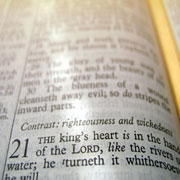
| Back To Meditation Home Page |

Custom Search
|
Are we Living in the Last Days...End Times? See Breaking News |
 |
| __________________________ |
 |
_________________________ |
| __________________________ |
As You Study the Biblical Last Days in the News... Discover the Bible As Well |
 |
| __________________________ |
 |
| __________________________ |
 |
| __________________________ |
To Know God's Word Read Scripture |
 |
_________________________ |
To Read God's Word Your Reading Schedule |
 |
_________________________ |
 |
| __________________________ |
Thought Provoking Articles for Your Meditation |
 |
_________________________ |
God, LORD, Lord, lord. What's the Difference? |
|---|
 |
When the word LORD (all capitals) is used in the King James Bible the reference indicates "God the Father". When we see the word Lord written with a capital "L" followed by lower case letters "ord" the reference is "God the Son". Without knowledge of the details of capitalization the verse below is difficult to understand:
Instead of God talking to Himself, something else or someone else, a conversation between God the Father and God the Son is seen. The verse is enabled, makes perfect sense and comes alive. Meditation on this particular verse is greatly enhanced by knowing a "small" detail of capitalization convention. In a similar manner, when lord is seen in the King James text (with all lower case letters) the reference is always to mere mankind. Also, when God with a capital G followed by lower case "od" the reference indicated is the Trinity. When god is formed with all lowercase letters the inference is that a false god is referenced. There are a number of instances in the Bible where no name of God is employed, but where simply the term "name" in reference to God is used as the point of focus: (1) Abraham called on the name of the Lord (Gen. 12:8; 13:4). (2) The Lord proclaimed His own name before Moses (Ex. 33:19; 34:5). (3) Israel was warned against profaning the name of the Lord (Lev. 13:21; 22:2, 32). (4) The name of the Lord was not to be taken in vain (Ex. 20:7; Deut. 5:11). (5) The priests of Israel were to minister in the name of the Lord (Deut. 18:5; 21:5). (6) The name of God is called "wonderful" in Judges 13:18. (7) To call on the name of the Lord was to worship Him as God (Gen. 21:33; 26:25). Consequently, from this we can conclude that such phrases as "the name of the LORD" or "the name of God" refer to God's whole character. It was a summary statement embodying the entire person of God. 1 When we turn to the New Testament we find the same. The name Jesus is used in a similar way to the name of God in the Old Testament: (1) Salvation is through His name (John 1:12). (2) Believers are to gather in His name (Matt. 18:20). (3) Prayer is to be made in His name (John 14:13-14). (4) The servant of the Lord who bears the name of Christ will be hated (Matt. 10:22). (5) The book of Acts makes frequent mention of worship, service, and suffering in the name of Jesus Christ (Acts 4:18; 5:28, 41; 10:43; 19:17). (6) It is at the name of Jesus that every knee will one day bow and every tongue confess that Jesus Christ is Lord (Phil. 2:10-11). So, just as the name of God in the Old Testament spoke of the holy character of God the Father, so the name of Jesus in the New Testament speaks of the holy character of God the Son. 2 In our twentieth century Western culture, personal names are little more than labels to distinguish one person from another. Sometimes nicknames are chosen which tell something about a person, but even this is a poor reflection of the significance of names in the Bible. Unfortunately, to many the names LORD, Lord or God convey little more than designations of a supreme being. It says little to them about God's character, His ways, and what God means to each of us as human beings. But in Scripture, the names of God are like miniature portraits and promises. In Scripture, a person's name identified them and stood for something specific. This is especially true of God. Naming carried special significance. It was a sign of authority and power. This is evident in the fact that God revealed His names to His people rather than allowing them to choose their names for Him. This is also seen in the fact that God often changed the names of His people: Abram to Abraham, Sarai to Sarah, Jacob to Israel. Note also how this concept of authority and power is seen when Nebuchadnezzar changed the names of Daniel and his three friends. Some of the names of God used in scripture are listed below: (1) Elohim: The plural form of EL, meaning "strong one." It is used of false gods, but when used of the true God, it is a plural of majesty and intimates the trinity. It is especially used of God's sovereignty, creative work, mighty work for Israel and in relation to His sovereignty (Isa. 54:5; Jer. 32:27; Gen. 1:1; Isa. 45:18; Deut. 5:23; 8:15; Ps. 68:7). Compounds of El:
(2) Yahweh (YHWH): Comes from a verb which means "to exist, be." This, plus its usage, shows that this name stresses God as the independent and self-existent God of revelation and redemption (Gen. 4:3; Ex. 6:3 . Compounds of Yahweh: Strictly speaking, these compounds are designations or titles which reveal additional facts about God's character.
(3) Adonai: Like Elohim, this too is a plural of majesty. The singular form means "master, owner." Stresses man's relationship to God as his master, authority, and provider (Gen. 18:2; 40:1; 1 Sam. 1:15; Ex. 21:1-6; Josh. 5:14). (4) Theos: Greek word translated "God." Primary name for God used in the New Testament. Its use teaches: (1) He is the only true God (Matt. 23:9; Rom. 3:30); (2) He is unique (1 Tim. 1:17; John 17:3; Rev. 15:4; 16:27); (3) He is transcendent (Acts 17:24; Heb. 3:4; Rev. 10:6); (4) He is the Savior (John 3:16; 1 Tim. 1:1; 2:3; 4:10). This name is used of Christ as God in John 1:1, 18; 20:28; 1 John 5:20; Tit. 2:13; Rom. 9:5; Heb. 1:8; 2 Pet. 1:1. (5) Kurios: Greek word translated "Lord." Stresses authority and supremacy. While it can mean sir (John 4:11), owner (Luke 19:33), master (Col. 3:22), or even refer to idols (1 Cor. 8:5) or husbands (1 Pet. 3:6), it is used mostly as the equivalent of Yahweh of the Old Testament. It too is used of Jesus Christ meaning (1) Rabbi or Sir (Matt. 8:6); (2) God or Deity (John 20:28; Acts 2:36; Rom. 10:9; Phil. 2:11). (6) Despotes: Greek word translated "Master." Carries the idea of ownership while kurios stressed supreme authority (Luke 2:29; Acts 4:24; Rev. 6:10; 2 Pet. 2:1; Jude 4). (7) Father: A distinctive New Testament revelation is that through faith in Christ, God becomes our personal Father. Father is used of God in the Old Testament only 15 times while it is used of God 245 times in the New Testament. As a name of God, it stresses God's loving care, provision, discipline, and the way we are to address God in prayer (Matt. 7:11; Jam. 1:17; Heb. 12:5-11; John 15:16; 16:23; Eph. 2:18; 3:15; 1 Thess. 3:11) What is God's name anyway? It is a NAME on which to meditate, isn't it? |
| As always, remember . Be blessed and meditate or meditate and be blessed!!!!.. the choice is yours!! |